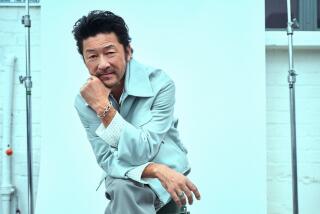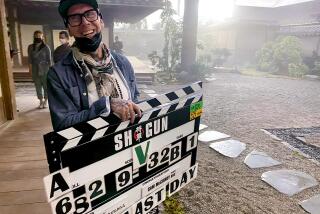Why ‘Ghost in the Shell’ is far from the last Hollywood film you’ll see based on Japanese manga
The opening set piece in Paramount’s “Ghost in the Shell” should be soothingly familiar to those who love Masamune Shirow’s groundbreaking manga comic book on which the live-action 3-D movie adaptation was based — at least, insofar as any on-screen shoot ’em up can reasonably evoke fan nostalgia.
Portraying a special ops police cyborg named the Major, Scarlett Johansson dives off the top of a skyscraper in downtown Neo-Tokyo cloaked in “thermal-optical camo,” a kind of tactical invisibility device, before shattering through a window with twin pistols blazing to take out the bad guys.
A strikingly similar sequence appears in the opening pages of Shirow’s bestselling Japanese comic series (original title: “Mobile Armored Riot Police”). And according to director Rupert Sanders, that’s no accident.
His objective was to stay true, he says, to the “world of unbridled imagination and philosophical introspection” first established within “Ghost’s” manga origins.
If you say ‘manga,’ unless you’re in the right age group — the geek group — they say, ‘What’s manga?’
— Producer Avi Arad
“All of the offerings in the ‘Ghost in the Shell’ universe are spawned from Shirow’s imagination,” Sanders says. “Cinematographer Jess Hall and I were conscious of framing our shots as though from a manga perspective. … To design, imagine and construct a world this unique and dense was, of course, a difficult task.”
Known for its quirks — manga is read right to left, as per traditional Japanese, even when written in English — as well as the visual density of its action-packed illustrations and a devoted readership that follows the comics’ serialized installments over decades with nearly religious zeal, manga has remained at the fringes of American cultural consumption since the early 1950s. It is also often overshadowed by anime, the distinctly Japanese form of hand-drawn or computer animation seen in the TV series “Sailor Moon” and 1988’s sci-fi epic “Akira.”
But now, with “Ghost in the Shell” poised to pull in around $30 million over its debut weekend in theaters (per estimates in pre-release box-office tracking), Hollywood seems to have awakened to manga’s slumbering commercial potential. And with a growing number of live-action versions of these beloved Japanese comics in various states of development along the studio pipeline, manga is no longer the exclusive province of cosplay conventions and genre geeks.

Trailer, which includes Scarlett Johansson, for “Ghost in the Shell.”
Last month, writer-director Robert Rodriguez (“Sin City,” the “Spy Kids” franchise) began filming an adaptation of the 1990 cyberpunk manga serial “Alita: Battle Angel” — about an amnesiac cyborg turned bounty hunter — co-starring Oscar winners Mahershala Ali and Christoph Waltz and co-produced by “Avatar” filmmaker James Cameron. “This project is near and dear to me,” Cameron said in a statement, going on to describe the thriller, which hits theaters in July 2018, as a “kick-ass epic.”
In January, Warner Bros. bought the feature rights for Hajime Isayama’s wildly popular manga comic “Attack on Titan,” which is set in a dystopian future where mankind is battling a race of freaky, naked, flesh-eating giants called Titans. David Heyman (producer of “Fantastic Beasts and Where to Find Them” and all eight movie installments of “Harry Potter”) will oversee production.
Lionsgate is moving forward with a live-action, big-screen blowup of “Naruto,” a long-running manga serial that has sold more than 200 million copies worldwide. And August will see the global release of the Netflix original film “Death Note,” based on the cultishly beloved manga/anime franchise of the same name. Directed by Adam Wingard, responsible for the horror films “Blair Witch” and “You’re Next,” it features “Paper Towns” star Nat Wolff as a high school overachiever who accidentally becomes a kind of supernatural vigilante after finding a mysterious notebook that gives him the power to kill anyone whose name is inscribed within its pages.
Co-founder and former chairman/chief executive of Marvel Studios Avi Arad is one of the architects of the blockbuster Marvel Cinematic Universe and helped turn such films as 2002’s “Spider-Man” and “Iron Man” into massive hits at a time when superhero movies were still considered niche entertainment.
See the most-read stories in Entertainment this hour »
Arad began developing a live-action version of “Ghost in the Shell” eight years ago — first with Steven Spielberg attached to direct — but faced stiff resistance while making the studio rounds to secure financing for the film. Even though the property had already inspired two popular animated feature films, video games, art books and TV series and influenced the Wachowski siblings to create “The Matrix,” the producer still encountered general befuddlement whenever he uttered the M-word.
“If you say ‘manga,’ unless you’re in the right age group — the geek group — they say, ‘What’s manga?’” said Arad. “It’s confusing to read something from right to left. It’s really not an easy sell.”
Arad persevered, convinced that Shirow’s sci-fi police procedural — built around a strong female hero struggling to reconcile her basic humanity (the character’s “ghost,” a.k.a. her soul) with her synthetic body (a.k.a. her cyborg “shell”) — could provide a lucrative new franchise at a time of increasing audience fatigue with superhero fare. “I’ve done comics to film; it was very successful,” he said. “I felt we need something new.”
Now his Arad Productions shingle has no fewer than five manga-derived live-action films in development, including “Naruto,” which follows the exploits of a misunderstood teenage ninja and will be directed by visual effects specialist-turned-filmmaker Michael Gracey.
“It’s a story about how trauma shapes lives,” explains Arad’s son and producing partner Ari Arad. “It’s set in this incredibly visual and cool world. But it’s about this kid whose greatest superpower is his compassion. All the hardships he’s had in his life make him more brave.”
In Hollywood’s sudden rush to adapt manga — one of Japan’s most ethnically distinct cultural exports — for Western audiences, however, there has been no small amount of fan consternation over allegations of “whitewashing.” That is, hiring Caucasian actors to portray Asian characters.
Earlier this month, a petition protesting Netflix’s decision to change “Death Note’s” Japanese protagonist Light Yagami into Wolfe’s non-Asian character Light Turner went viral, drawing more than 13,000 online signatures.
“The story itself is full of Japanese culture, history, and identity — and the Japanese narrative is essential to the plot and storytelling,” wrote petitioner Sarah Rose. “‘Death Note’ shouldn’t be cast with all white actors — as it goes against the very soul of the story.”
Likewise, Paramount and the “Ghost” filmmakers first came under fire in 2015, when it was announced that Johansson would occupy the role of a character who is named Maj. Motoko Kusanagi in the original manga comic and anime films. Such allegations have continued to dog the adaptation.
But to hear it from Avi Arad, any discussion of race is beside the point because Johansson — Hollywood’s most bankable female movie star and a veteran of such blockbuster action and genre fare as “The Avengers” and “Lucy” — was the only actress ever considered for the part. “We always saw one face,” he says. “Scarlett.”
(For his part, Mamoru Oshii, director of both anime film versions of “Ghost in the Shell,” seems to dismiss the controversy in recent interviews, remarking in an online featurette for the Paramount film: “Scarlett Johansson playing Motoko from beginning to end has gone above and beyond my expectations for the role.”)
Even as the industry ushers in this golden age for American live-action adaptations of manga, some hardcore genre fans remain unconvinced that Hollywood will do right by the Japanese comics, pointing to the fiasco of 2009’s “Dragonball Evolution,” an action-fantasy released by 20th Century Fox that’s based on one of the most successful manga serials of all time. Widely panned by critics, the movie disappointed fans and barely squeaked out a break-even in worldwide box office.
“There are tempered expectations,” says Joseph Luster, digital editor for Otaku USA magazine. “People have been burned so much in the past. It’s kind of like video game movies. There’s a history of these things not being handled properly.”
Toward that end, Avi Arad emphasizes not all manga are ready for their Hollywood close-up.
“This can be a dangerous genre if you develop the wrong movies,” he says. “We love manga but you have to find something with a real international appeal.”
Ari Arad highlights the thematic diversity of manga being adapted these days, spanning horror, sci-fi and fantasy and intended to run the MPAA ratings gamut from PG to the hardest of hard Rs.
“If it was all things like ‘Ghost in the Shell,’ that would be one thing. But the bulk of these stories are really different from each other,” the younger Arad says. “That’s super exciting. Hopefully it means there are more that are going to happen. And also that they will continue to attract top talent. Success breeds confidence — which breeds more success.”
Sign up for our weekly Indie Focus newsletter »
Find Chris Lee on Twitter: @__ChrisLee
ALSO
Review: The ravishing sci-fi noir ‘Ghost in the Shell’ is fascinating, and not without its glitches
The original ‘Ghost in the Shell’ was a watershed film in animation history
Sixteen years later, ‘Donnie Darko’ makes an eerily prescient return
‘13 Reasons Why’ is Netflix’s newest must-see series
More to Read
The biggest entertainment stories
Get our big stories about Hollywood, film, television, music, arts, culture and more right in your inbox as soon as they publish.
You may occasionally receive promotional content from the Los Angeles Times.











